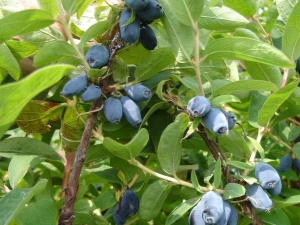Why is honeysuckle bitter and how to fix it?

Honeysuckle shrub on the site will delight with its beauty and will find application in medicine, cooking, cosmetology.
About plant
Honeysuckle - curly shrub with edible berries that have a sweet-sour taste, which always grow in pairs.The first description of the plant is found in the historical treatises of the countries of Southeast Asia in the sixteenth century. The plant is unpretentious, winter-hardy (withstands temperatures down to -40 degrees), often used instead of hedges, as it is easy in garden care.
Bitterness of berries
Honeysuckle berries in the garden ripen early. With all the positive characteristics of the fruit have a bitter taste. This is due to several reasons.
One of them is the use of low-quality varieties for planting material. Science does not stand still and offers plants that do not depend on the place of growth, weather conditions. Honeysuckle grown from seeds of wilderness, always bitter.
The second reason - the cultivation of shrubs with improper care. Since he loves moisture, in the rainy season, the berries acquire a sweet or sour-sweet taste. When the moisture during ripening is normal, the fruits will have a slight bitterness, not harmful to the body. The dry period has a bad effect on the taste qualities of honeysuckle: the intense heat makes them bitter.
Such bred varieties as "Bogdana", "Gerda", "Altair", "Bakcharskaya", "Lazurit", "Amazon", "Early", "Chosen One", "Gzhelskaya" and others, do not depend on natural factors and give the sweetest harvest.
Care
Acquaintance with honeysuckle is desirable to begin with a set of information about the desired variety. It is recommended to acquire two-year bushes, with two or three times branching, up to 40 centimeters high, with flexible branches, without damages. One of the features of the plant is peeling of the bark (this is normal). Special attention should be paid to the root system: it must be developed. Since the plant is cross-pollinated, it is recommended to plant several shrubs nearby, picking up varietal pairs. Honeysuckle is propagated by green layers or seeds.
When planting, it is preferable to choose a plot with penumbra, fertile soil, protected from the wind. Worst of all, the plant will feel on sandy soil and in wet places. Honeysuckle is sick very rarely.
For prophylaxis after harvesting can be sprayed with a special preparation. Unpretentious shrub requires spring feeding, attention during the ovary.
After two seasons, you get the first harvest of vitamin berries. All of these recommendations will make it possible to enjoy the fruits and reduce the amount of bitterness in them.
Beneficial features
The fruits of honeysuckle dark blue color, with a waxy bloom, have a large number of useful substances: trace elements, macronutrients, pectin, astringents, giving bitterness. The honeysuckle complex of vitamins has a good effect on the maintenance of the functions of the heart and blood vessels, strengthening the immune system, a stimulating effect on the body.
The bark, leaves, young shoots, flowers also have healing properties, working as an anti-inflammatory, choleretic, diuretic, disinfectant. A decoction of branches and leaves is used for rinsing, rinsing eyes, removing edema, flowers - will ease the period of cold sickness and sore throat, juice - normalizes the nose, and essential oil - will be a component for inhalation.
Honeysuckle in nontraditional treatment is indispensable for metabolic disorders, headaches, failures in the functioning of the liver and digestion.
Daily use of honeysuckle berries in various versions will be a good prevention of maintaining the body. In cooking from honeysuckle jams, preserves, sauces, compotes, juices are prepared. The original taste allows the use of fruits in a damp, dried, frozen state. Essential oil of honeysuckle is popular in cosmetology, it is used for massage, creams, tonics. These remedies are used to soothe inflammation and redness of the skin.
Contraindications for honeysuckle are almost absent, but medicine advises less or completely to stop using it for children with diathesis, people with diabetes, suffering from diarrhea, with increased acidity of the stomach or individual intolerance.With the abuse of berries may appear side effects in the form of skin rashes, intestinal disorders, despite its beneficial properties.
In the next video, the agronomist explains in detail why the honeysuckle is bitter.





























